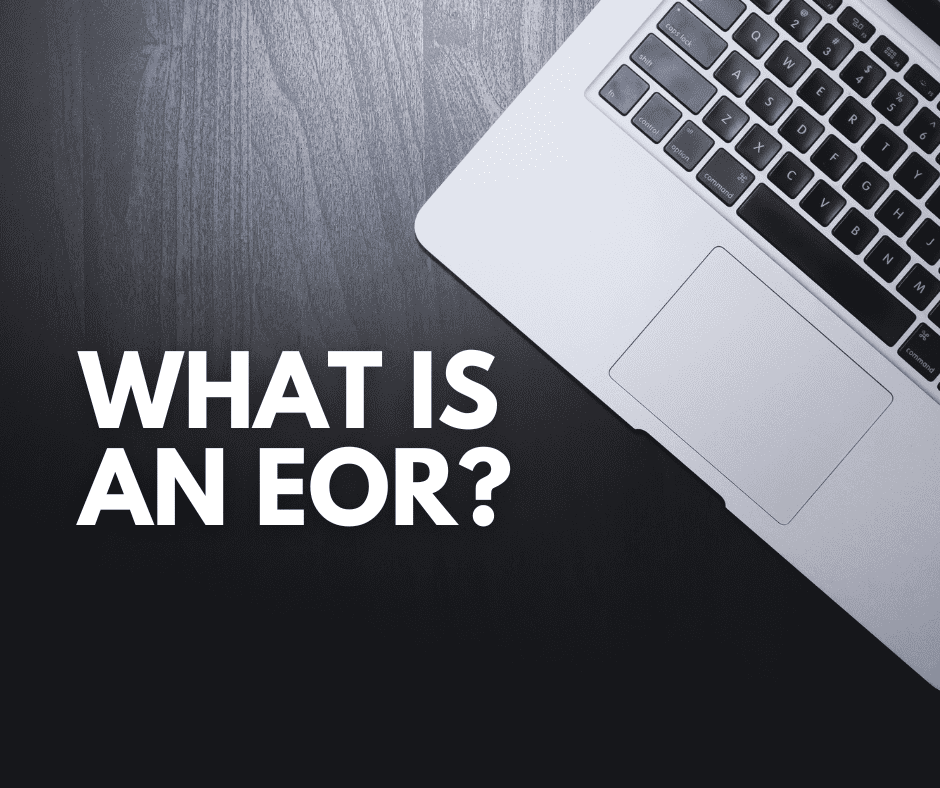- How to Pay International Contractors [My Best Options] - May 21, 2023
- What is an EOR and Should You Use One? - December 13, 2022
- What is a PEO and Who Should Use One? - December 12, 2022
Have you heard about an “EOR”, but aren’t sure what it really means? Totally get it. You are in the right place.
Even with some HR experience, I initially wasn’t clear on the term a few years back, especially as it related to a PEO (somewhat similar in function). That said, I’ve done the research and (as a business owner) have worked with both PEOs and EORs
EOR Definition
The simple answer here is that an EOR is the “employer of record”. That’s literally what the abbreviation translates to.
What Does an EOR Actually Do?
EORs are useful for companies when they not only want to outsource HR functions, but also need labor to be employed by a separate entity all together. In this situation someone might be working AT your company onsite, but is technically (and legally) employed by the EOR service.
This can be useful for companies for a variety of reasons (see below), but generally can reduce costs, employment liability, labor force flexibility, and streamline regulations (my company can have a single reporting structure to the EOR, whereas the EOR is responsible for all of the employees from an pay and HR perspective).
EOR Video Explainer
A bit of a wonky video, but a good summary.
Different Types of EORs
There are a few common EOR structures that I’ve encountered “in the wild”. They are as follows:
- Direct Model EOR: EOR incorporates or registers in the country where services are offered, then hires locals to supply those services to clients.
- Indirect Model EOR: EOR subcontracts with a local partner to deliver services to consumers even though it is not incorporated or registered in the country supplying the services.
- Hybrid EOR: Direct and indirect models combined into a hybrid model.
With the Indirect Model, things can get a bit complicated depending on local complexities of hiring, reporting, liability, etc… For example, I’ve seen sub-sub-contracts.
It’s more standard to see EORs mostly using a Direct Model, but sometimes utilizing a Hybrid Model for hard to fill requirements.
Benefits of an EOR
Here here the core benefits of using an EOR service:
- Saves Cost: Employers may hire, manage, and pay employees more affordably by using Employer of Record (EOR) services.
- Regulatory Compliance: EORs are in charge of ensuring that payroll, tax, and employment laws and regulations are followed.
- Expands Workforce Talent Pool: Employers can swiftly and easily hire workers in far-off places or other nations thanks to EORs.
- Administers Benefits: EORs can also offer employers benefits like insurance, retirement plans, and other perks for workers.
- Reduces Administrative Burden: EORs also assist in easing the administrative responsibilities associated with hiring and orienting new staff.
- Provide Flexibility: EORs may provide for more flexibility in employee contracts, which may be advantageous to businesses
Disadvantages of an EOR
That said, there are some drawbacks of an EOR that are worth considering up front:
- Lack of Control: The company loses control over its personnel, including recruiting, dismissing, and other employee decisions, when it outsources the management of employees. An EOR also may not always compensate their employees to the same standard your company might.
- Loss of Brand Identity: Businesses that outsource their staff to an EOR risk losing their identity, which makes it harder for consumers to connect with the brand.
- CAN Sometimes be More Expensive: Due to the fact that Employers of Record frequently charge a fee for their services in addition to the salary they pay their employees, they can be rather expensive per employee.
What Types of Companies are EORs Good For?
EORs can be great options for many companies, but there are some clear stand out cases I’d consider first:
- Accessing International Labor Pools: If your company needs consistent labor from overseas markets, but don’t want to take the risk (or expense) of local nation compliance, an EOR can be a scalable way to more rapidly access these labor pools
- Seasonal or Short Term Labor: A specialist EOR can also be a great option for “surge” labor needs, either seasonally, or for other unique reasons. Because an EOR likely has a strong footprint and can load balance across clients, a company that contracts with them can leverage shorter term needs without as much HR headache.
- Sourcing Hard to Find Labor: An EOR can often have features similar to a staffing agency, but in a local market. As such, an EOR might be a good option when you’ve exhausted your own recruiting efforts for a hard to fill role or function.
- Companies Needing Labor Flexibility: A simple risk mitigation measure is to have an EOR responsibility for a certain percentage of your workforce. This makes scaling up (and down) talent much faster. In difficult economic times, it gives managers and executives optionality.
Should You Use an EOR?
This is quite a personal decision based on the unique circumstances of your company.
That said, the nice thing about EOR’s is that they are fairly flexible. There’s relatively low risk in trying an EOR out, at least for a small segment of your workforce.
If you don’t like completely giving up control and losing as much visibility, consider using a PEO service instead.

